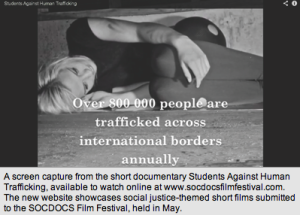
Student Films for Social Justice
Article by Chet Greason – Stratford Gazette
Veteran educator John Esposito has spent years teaching generations of high school students about English literature, drama, and communication technology; but five years ago, he discovered his students were lacking awareness regarding an extremely important subject.
At the time, his drama class at St. Michael Catholic secondary school was tackling a trilogy of plays adapted from popular, as well as socially poignant, novels.
“We were doing Lord of the Flies, Fahrenheit 451, and 1984,” Esposito explains. “And I realized students should be more aware of social justice issues.
“With the epidemic use of the Internet, a lot of them are living on YouTube,” he adds, noting there’s “nothing evil about Twitter; but it’s all so trivialized. Why can’t we look at serious issues?”
That idea became the seed that grew into the SOCDOCS film festival.
Esposito challenged his communication technology class to make a series of short films dealing with subjects of their choosing, provided it dealt with a social justice issue such as war, poverty, the environment, prejudice, or addiction.
He was impressed by the finished films, but felt they needed an audience. The filmmakers were invited by the chaplain of King’s College at University of Western Ontario to showcase their videos as part of its annual Carpe Diem conference.
Further video projects were completed as more classes were brought into the mix. Soon English, writing, drama, and media arts students were making short, socially relevant documentaries. Esposito found a partner in fellow teacher Tina Robinson, and the initiative moved beyond the walls of St. Mike’s to other area schools.
Two years ago, the latest videos were gathered together as part of a new film festival. It was open to schools from the separate, private, and public boards. More entries were submitted the following year, and Esposito struck up a partnership with the Foundation of Education Perth Huron’s Wes MacVicar in an effort to find funding and bolster student involvement.
Last year’s film festival was held at the University of Waterloo’s Stratford campus, and attracted the largest collection of documentaries yet. The top films were chosen by a panel of judges and winners received cash prizes. Liam McIntosh was awarded a gold medal and $250 for his film A Way Out, which addressed teen drug abuse.
This month, Esposito and organizers cut the ribbon on a SOCDOCS website, www.socdocsfilmfestival.com. The site includes submission info, event dates, and showcases a selection of films, including documentaries addressing human trafficking, addiction, and marriage equality.
Esposito clarifies his festival is not affiliated with any one school or school board, although he’s hesitant to classify it as extracurricular.
“I would call it a co-curricular event,” he says, adding participation in the festival is mandatory in his media arts class. He stresses any teacher interested in an avenue that promotes social enrichment is encouraged to get involved.
Beyond schools, any young person wishing to submit a short documentary is welcome too, although Esposito stresses the need for them to have some sort of chaperone or coordinator to advise them. He notes members of the Stratford Youth Centre are currently in the process of making a SOCDOCS film.
The only other requirements are that the subject matter is appropriate for a secondary school audience and that the film is free of copyrighted material.
Non-documentary short films of other genres, such as comedy, will be accepted, but must address social justice in some way.
Currently, the SOCDOCS festival is holding a minidocs contest centred around the subject of hope. Videos must not only address a social justice issue but suggest a positive response or solution. All entries must be under two minutes in length and are to be received no later than Dec. 13. Entries will be posted on the SOCDOCS website with the top three films receiving gold, silver, and bronze medals. Winners will also be formally recognized at the full SOCDOCS film fest May 23.
“To the average teenager, these concerns tend to appear somewhat disconnected from the Download Culture of iTunes and YouTube,” writes Esposito on the SOCDOCS website. “Not that there is anything wrong with that, but the fact remains that the social network media leave little time for impressionable young people to try and change the world.
This event will celebrate the achievements of young filmmakers who use their artistic creativity through the media arts to promote equality, democracy, and solidarity for a just, peaceful and compassionate society.”



